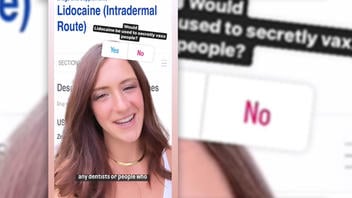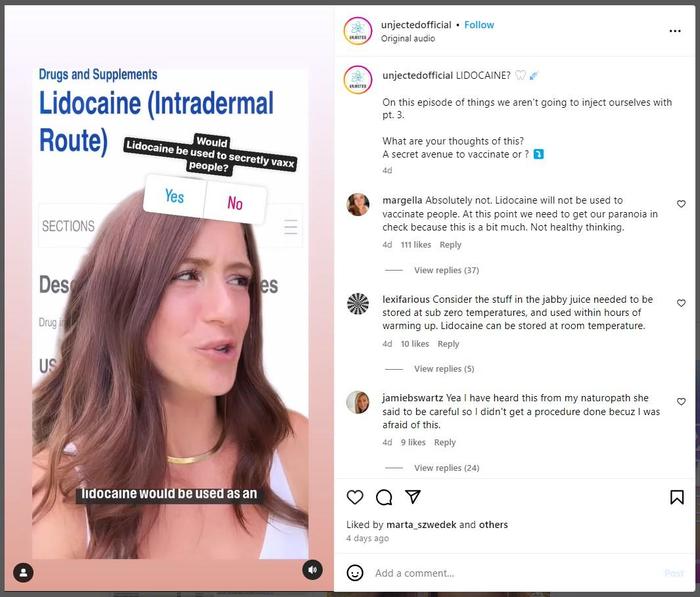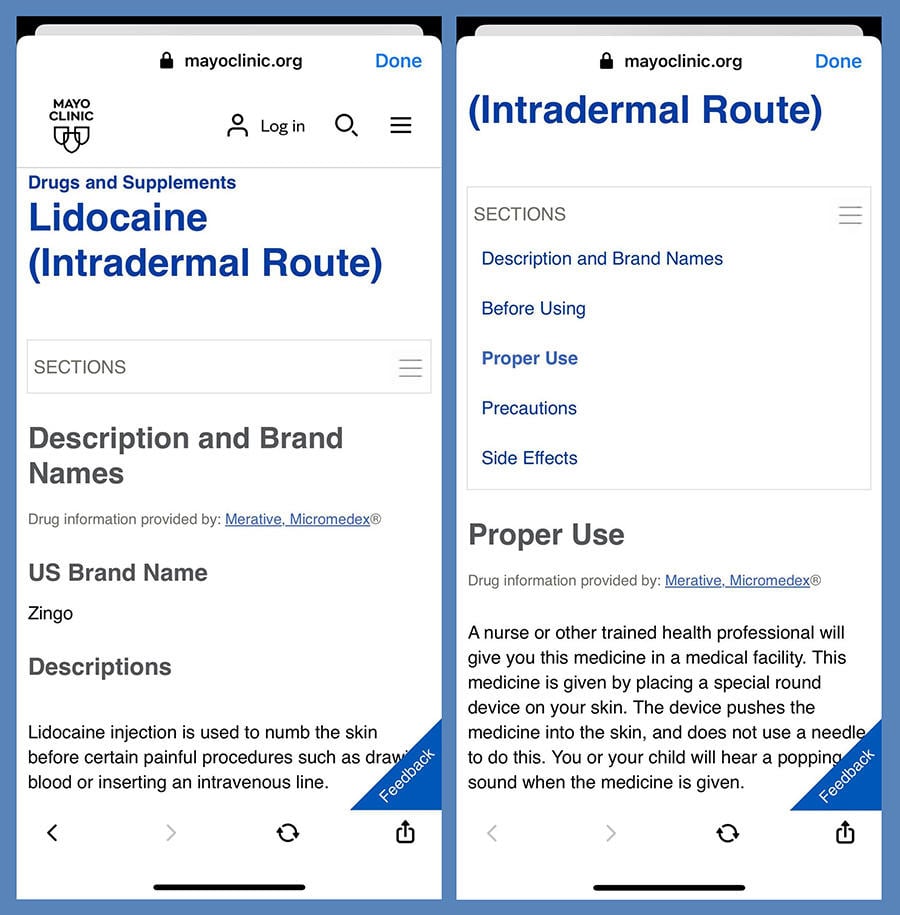
Is there evidence health care providers are using lidocaine to secretly inject people with vaccines without the person's knowledge, as is suggested in a social media post by an anti-vaccine activist? No, that's not true: The suggestion is made in the "just asking questions" mode in which allegations are framed as questions to inject falsehood into public discussion. In this instance, the suggestion is made without citing any specifics: The post cites no reports of reformulated lidocaine, no reports of dentists or other medical professionals violating laws and codes of professional ethics to secretly vaccinate patients and no reference to expert description of the effect of lidocaine mixed into vaccines.
The accusatory suggestion appears in a video (archived here) published by @unjectedofficial on January 26, 2024. It opened with this caption:
On this episode of things we aren't going to inject ourselves with pt. 3.
What are your thoughts of this?
A secret avenue to vaccinate or ? ⤵️
(Source: Instagram screenshot taken on Tue Jan 30 23:26:10 2024 UTC)
The narrator in the video, Shelby Hosana (formerly Shelby Thomson), the founder of Unjected, a dating platform for the unvaccinated, poses the accusatory question for discussion: "... don't you think that lidocaine would be used as an avenue to secretly vaccinate people?" She says:
On another episode of things we are never going to inject ourselves with again: We're going to be talking about Lidocaine, which of course is used at the dentist. A couple of other uses, but mainly this is where you're going to see it at. And I've done some digging, but I would like to invite any dentists or people who work in this field into the chat. I want to hear what you think, especially.
But I have found ingredients lists on lidocaine. They don't seem to have blood products in them but in this post-2021 world where we know that so many things could be compromised, don't you think that lidocaine would be used as an avenue to secretly vaccinate people?
Maybe I'm just being paranoid. Maybe it's extra vigilance?
But I want to hear what your thoughts are on lidocaine. Drop it in the chat. Let's talk about what exactly is going on here.
Lidocaine is a local anesthetic that is available in many different forms. Some topical applications are available as a spray, gel, cream, ointment and an extended release patch. There are many resources (Google search here) that discuss the use of topical lidocaine in conjunction with vaccines because it can be used to numb the skin at the injection site for infant and childhood immunizations.
But that is not the delivery Hosana is suggesting. She posits that a vaccine might be added to a lidocaine injection solution to secretly vaccinate a person who is only expecting a numbing injection for a dental procedure. The question of mixing vaccines with lidocaine is met with what is known as a "data void." Information that might counter this accusatory question doesn't exist -- because there is no evidence this is happening. Package inserts for COVID-19 vaccines give specific instructions on how to thaw, handle and dispose of vaccine vials and syringes. They do not cover an exhaustive list of all the possible things one should not do.
The "Lidocaine (Intradermal Route)" screenshot appearing as the green screen background for this video (pictured above) originated on the Mayo Clinic website. Mobile phone screenshots (pictured below) show how the "Description and Brand Names" page and the "Proper Use" page appear on the Mayo website. According to the Centers for Disease Control and Prevention (CDC), "No routinely recommend[ed] U.S. vaccines are administered by the intradermal route of injection." This specific lidocaine preparation by the now-discontinued brand named Zingo is a powder used without a needle to numb the skin before an injection:
A nurse or other trained health professional will give you this medicine in a medical facility. This medicine is given by placing a special round device on your skin. The device pushes the medicine into the skin, and does not use a needle to do this. You or your child will hear a popping sound when the medicine is given.
(Source: Lead Stories composite image of mayoclinic.org screenshots taken on Wed Jan 31 01:06:54 2024 UTC)
No evidence this is happening
Due to the data void and the question's complexity, standard queries don't generate relevant results. This search query using Boolean operators on Google (Dentists AND "administer vaccines" AND lidocaine AND surreptitiously OR secretly OR covertly) returned no relevant results (archived here). Searches for "vaccinated secretly" or ""vaccinated surreptitiously" (archived here and here) return results about people who were vaccinated privately, or who did so out of turn, when the COVID-19 vaccines were rolled out.
Ethical considerations
Both the American Dental Association (ADA) and the American Medical Associations (AMA) have ethical codes regarding patient autonomy and informed consent. These ethical considerations would preclude covertly vaccinating a patient. In regards to the consent process, the ADA writes:
Proper implementation of informed consent is an opportunity to develop rapport with your patient resulting in enhanced dental health. The informed consent conversation also ensures that you have satisfied the ethical principle of 'Patient Autonomy' in that the conversation involves the patient in treatment decisions. Consult the ADA Principles of Ethics and Code of Professional Conduct for guidance. [.pdf here]
The chapter on Informed Consent from the AMA "Code of Medical Ethics" begins:
Few dentists administer vaccines
On March 11, 2021, an announcement from the Department of Health and Human Services (PDF here) expanded the categories of qualified persons who could administer COVID vaccines to include dentists. The following day the American Dental Association (ADA) reported on this, stating that at least 28 states already had this provision, but now with the Public Readiness and Emergency Preparedness Act, this was nationwide.
In an article published in June 2022 in the Journal of Public Health Dentistry titled "Dental providers' perceptions of the feasibility and acceptability of implementing vaccine administration programs in dental settings: a qualitative study," none of the 31 dental providers who were interviewed In August 2021 had experience administering vaccines in private practice settings.
On January 4, 2022, a panel survey of members of the American Dental Association Clinical Evaluators was published in the Journal of the American Dental Association. Responses came from 330 panel members. Forty-two percent did not know which vaccines their states permit them to deliver. Fifty-five percent were willing to administer COVID-19 and influenza vaccines. Only 2 percent were currently administering vaccines.
Vaccination fact sheet regulations vary
According to the CDC, "There is no Federal requirement for informed consent relating to immunization." This is left up to individual states, which may require a signed consent form.
It is a federal law that every person gets a Vaccine Information Statement (VIS) with any of the vaccines listed below. Under the National Childhood Vaccine Injury Act (NCIVA) the VIS document must be given prior to any of the following vaccinations: diphtheria, tetanus, pertussis (whooping cough), measles, mumps, rubella (German measles), polio, hepatitis A, hepatitis B, varicella (chickenpox), Hemophilus influenzae type b, rotavirus, pneumococcal conjugate, trivalent influenza (seasonal flu), meningococcal conjugate and human papillomavirus. This is not an informed consent form, but in some states it may double as one, as a VIS describes the risks and benefits of the vaccine.
There are other vaccines that have a VIS that are not part of the NCIVA; among them are: anthrax, cholera, dengue, Japanese encephalitis, pneumococcal polysaccharide, rabies, shingles, typhoid and yellow fever. If these vaccines were purchased under CDC contract, the "Duty to Warn" requires that the VIS must be used.
For specific COVID vaccines that are under the Emergency Use Authorization (EUA) the Food and Drug Administration requires a vaccine-specific EUA fact sheet be given to the vaccine recipients or their caregivers. For the COVID vaccines that have received FDA approval, the VIS can be found here.



















